Les Shannon — A Footballing Odyssey
Locally born, he served both Blue and Red during a long and varied career as a player, coach and manager that took him well beyond Britain's shores.
Merseysider Les Shannon has the distinction of serving both of the local football giants, but those are but two brief episodes in a long and varied career as a player, coach and manager that took him beyond these shores.
Born in 1926 and raised on Scarisbrick Road, Liverpool, he dreamed of donning the royal blue shirt of Everton. Meanwhile, he apprenticed as a joiner. His Blues dreams would be dashed, however. He later recalled: "I lived half-way between Goodison and Anfield and was a real Evertonian. But as a schoolboy I stood five foot nothing, and Everton kept telling me to come back later."
The Toffees’ reluctance to commit to a lightweight player who was buffeted in the C team, was the Reds’ gain, as he later explained: "One day, I went with a pal to watch Liverpool B team. They were a man short, so I played." Seeing the youngster's potential, the Reds stepped in to offer terms and he made 11 appearances at inside-forward in the immediate post-war years.
Off the pitch, he had pursued an apprenticeship in joinery, but he never had to rely on this trade. Unable to firmly establish himself in the Anfield first eleven, he transferred to Burnley in 1949 for a fee in the region of £6,000. There, under the watchful eye of coach Billy Dougall, he was given additional training to hasten his technical and physical development.
He spent a decade at Turf Moor, making 250 appearances, scoring 44 times in all competitions. An intelligent forward, he started off on the Clarets' right wing before moving to his preferred inside-left position. Three England B appearances and one outing for a Football League XI were scant reward for this cultured player who might have won full international honours had he been at a more glamorous club.
In the mid-1950s, he moved back to a left-sided wing-half role, impressing as much in the Number 6 shirt as he had with 10 on his back. Noted for being able to read a game superbly from this deeper role, he could mix attacking or defensive wing-half play, as the ebb and flow of the match dictated.
Rated alongside Reg Attwell as one of the club’s finest midfield players, Les was key to the gradual evolution in the Clarets’ playing style. In the 1960s, he told one journalist: "When I first arrived, Burnley’s play was very defensive. Then, over a period, we adopted a more positive approach, and I like to think I played some small part in building up the club’s present-day image of an attacking side. They play football as it should be played."
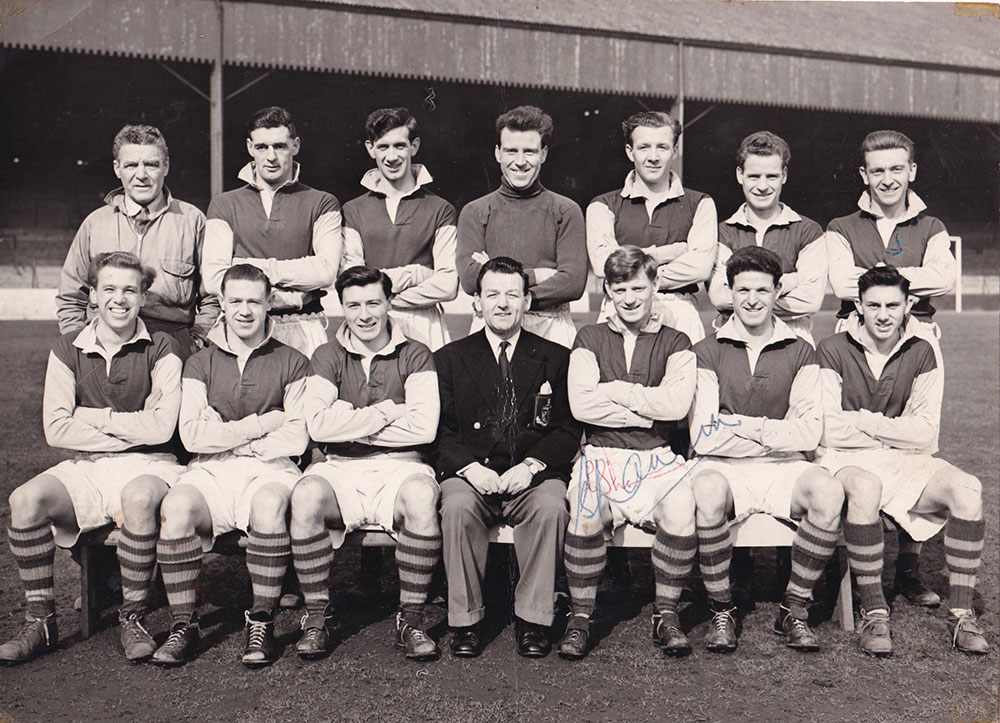
Les during his Burnley days
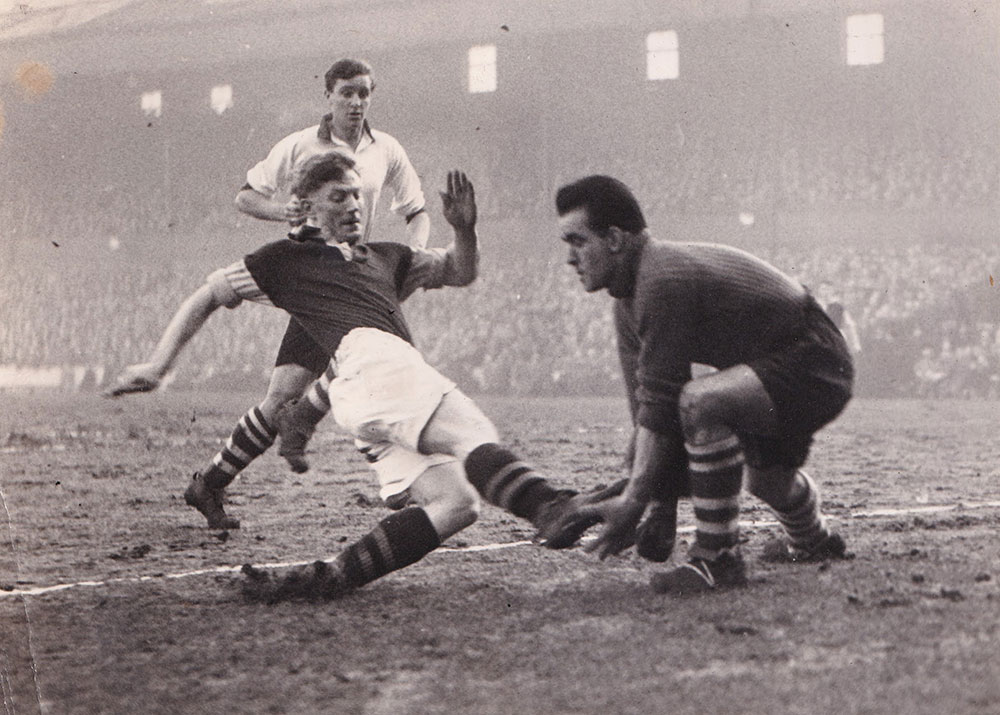
In action for the Clarets
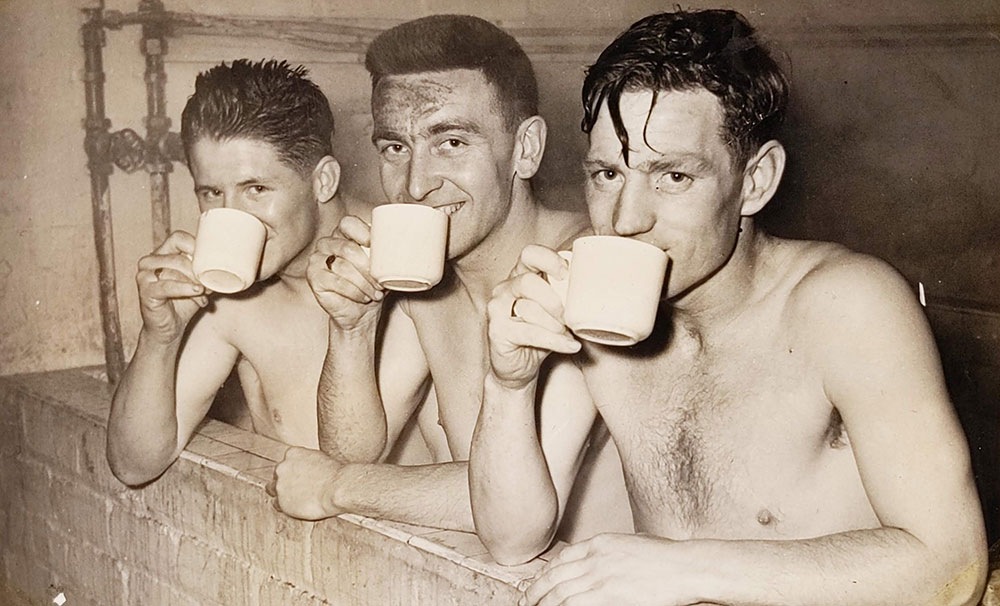
Celebrating with a cuppa
In August 1959, with his playing career winding down and injuries worsening, he overlooked an approach to join Southampton. Instead, he quit playing (after 281 appearances for Burnley) and joined his original footballing love, Everton, as a member of the backroom staff, earning £17 per week and receiving a loan of £1,800 towards a house purchase). He was appointed by Johnny Carey to coach the club’s youngsters and would take evening coaching sessions (with his son tagging along, although underage by a good number of years).
He would have considerable influence over the development of many emerging Everton footballers, including Tommy Wright, George Sharples, Roy Parnell, Mick Gannon, Alan Jarvis and Colin Harvey. The latter told me: "We used to train on Tuesday and Thursday nights on a pitch which is now part of the car park at Goodison. That was the first time I met Les. I have never worked with a coach before; before that it had been my dad.
"Les’s great love of football was quite infectious – that is my lasting memory of him. The things he came up with and the type of training left a big impression on me. He was very into ballwork, which I enjoyed. One thing that stuck with me was when he told us about an article he’d read about Brazilian kids on the beach controlling a ball made from orange peel. I had a lot of time for Les; he always had a smile on his face and it was a pleasure to work with him."
Gary Coxon, who would make first-team appearances for Blackburn Rovers after his release from Everton, recalls: "Les was a brilliant coach. I would say he was as good as anything I’ve seen. You never got bored when he was around, and for those days he had good coaching technique. He was quite severe but well liked."
Clearly ambitious and eager to learn, Les was permitted by his employer to attend an international coaching course in Switzerland in the summer of 1961. He would become a staff coach at the FA’s Lilleshall facility, taking courses and assessing players taking their badges, including the likes of Terry Venables.
By then, Johnny Carey had been dismissed, to be replaced by Harry Catterick in the Goodison hotseat. The two men, both with their own firm views on football, didn’t see eye to eye. Perhaps feeling that his days were numbered, Les was soon on the lookout for alternative employment.
In December 1961 he turned down the offer of the manager’s position at Tranmere Rovers, thereby missing the chance to complete his Merseyside club hat-trick. The increasingly fractious relationship with Catterick is illustrated by the May 1962 club board minute which recorded:
Mr Catterick reported that Shannon was not co-operating fully, and had refused to act as trainer when required. It was agreed that Shannon be told that he was expected to obey the manager’s instructions, or to look for another post.
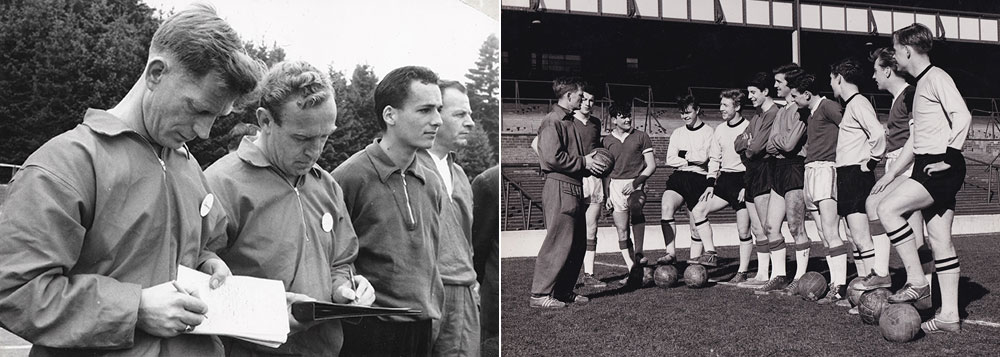
Left: With Billy Wright at a coaching course; Right: Coaching young hopefulls at Goodison Park
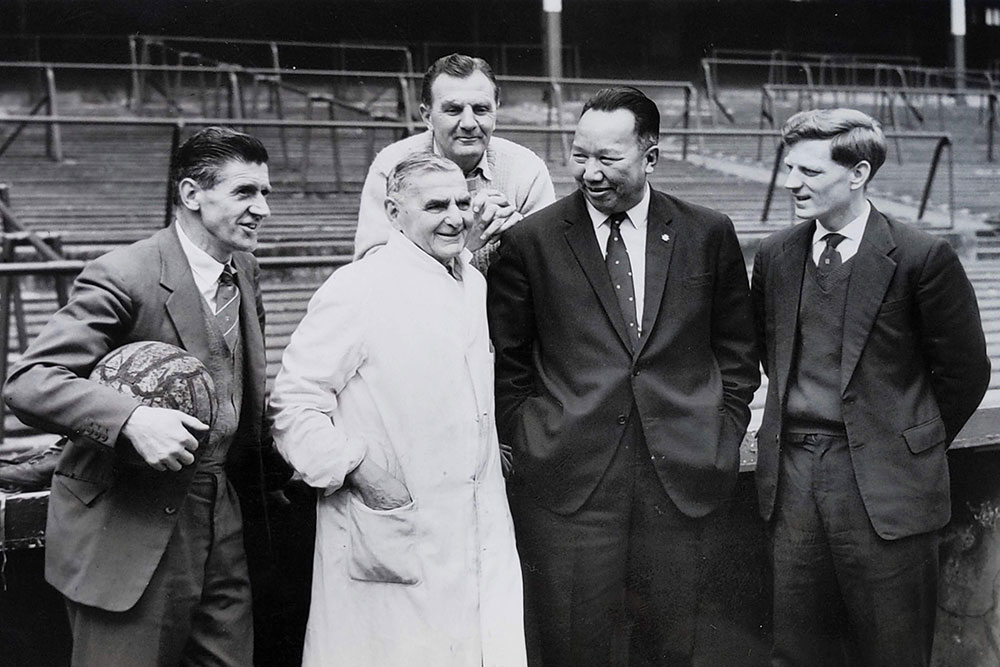
Showing a visitor Goodison Park, circa 1960, along with Gordon Watson, Harry Cooke and Stan Bentham
Subsequent board meeting minutes record that Les acquiesced with the directors’ demands – but a month later, he requested his release, which was granted. Leaving Everton, the trainer-coach moved south to another venerable club of the English game. He joined Arsenal under the former England captain Billy Wright, who he had got to know on FA coaching courses.
He kept his new-build house in Maghull (a wise investment, as it transpires) and took a Gunners club house in Cockfosters, North London. He told one reporter: "Arsenal is a wonderful club in every way. All the stories you read and hear about the magnificent set-up at Highbury more than ring true."
Again, his son – then in his early teens – would get a chance to join in training with the youngsters, including Charlie George, Pat Rice and John Redford. "One of the perks of your dad being the coach," is how Dave describes it.
Sacked along with Billy Wright in 1966, Les moved back to Lancashire to gain his first taste of management – and it was a successful one at that. He would lead Bury FC to promotion to the Second Division as runners-up, benefitting from having Colin Bell in the side and signing Bobby Collins, who he knew from their time together at Everton. Alex Lindsay, meanwhile, was sold to Liverpool.
After relegation for the Shakers, he was offered and accepted the role of manager at Blackpool in June 1969. Again, he immediately delivered promotion – leading the Seasiders to the promised land of the First Division (a Fred Pickering hat-trick sealing it).
In anticipation of the season back in the top echelon, the manager wanted a £150,000 transfer kitty but the board would not countenance it. Unsurprisingly, it was a slog in the First Division and Les was dismissed before the season was out.
He found it difficult to get another job in England but PAOK of Thessaloniki in Greece kept ringing up with the offer of the manager’s post. He was reluctant, thinking he would soon be forgotten about on the English job market, but the persistent, and ever-increasing salary offers, broke his resistance and he agreed to try it abroad for a year or two.
As it transpired, he broke the club’s silverware drought, beating Olympiakos in the final of the Greek Cup in 1972 as well as delivering a runners-up spot in the league. This gained the Liverpudlian hero status – anywhere he went he couldn’t pay for anything. People would shout "Mister, Mister" when he went into a food market, restaurant, or hailed a taxi. It was crazy but enjoyable and he would spend a decade in the country. He had hoped that PAOK would be drawn against Liverpool in the following season’s Cup Winners’ Cup, but it wasn’t to be.
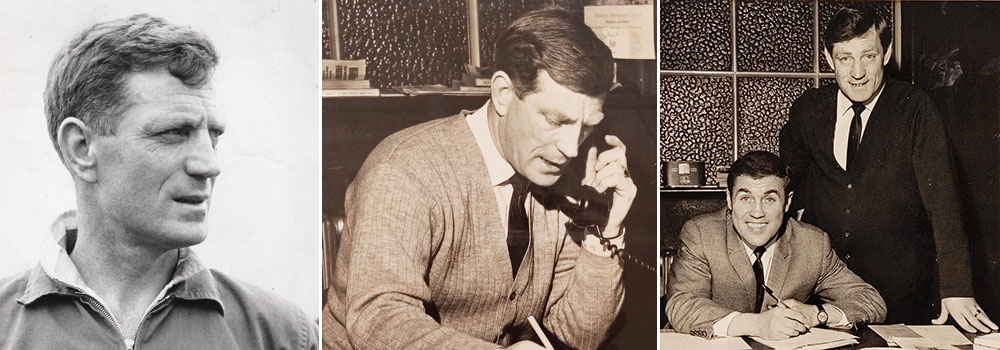
Left: Les the young manager; Middle: Busy working the phone; Right: Signing Bobby Collins for Bury
He had an interpreter at first for training sessions but he soon found that it didn’t give any emphasis to what he was saying – so he’d go up to the player and use facial expressions. In time, he picked up the local language, his son Dave recalls being amazed when Les once answered the phone and launched into fluent Greek: "I there was I thinking, 'He can’t talk in Greek, he’s a Scouser from Norris Green!’"
He would get back to Merseyside on occasion and would go with Dave to watch Liverpool FC at Anfield. Knowing Bill Shankly well, he was always invited to catch up with the backroom staff in the famous boot room. Taking in English football matches when home from Greece, Les was reportedly unimpressed with the stifling tactics and over-coaching of players; "They tell players too much and ask them too little," was his pithy summation.
He approved of the less structured development of players in Greece, who would learn the game on the street without the focus on systems and winning at all costs. He told journalist Robert Oxby: "Too many teachers and coaches are taking the enjoyment out of the game – the young player needs to blossom like a flower."
Things were disrupted at PAOK by the Greco-Turkish conflict over Cyprus in 1974, with many of his squad members called up for military service. As he was about to fly back to Merseyside to see his family, he found himself stuck in Thessaloniki for ten days, as the country swung into gear for armed conflict.
It wasn’t all a bed of roses in Salonika, in spite of his success – at one point, Les offered to resign in the wake of interference from directors. This promoted a storm of protest from supporters and the threat of strike action by the playing staff. The board beat a hasty retreat and pledged to keep out of team affairs.
After his spell at PAOK, he won the Greek Cup again, this time with Iraklis Thessaloniki in 1976 before moving to Olympiacos (who he led to a second-place finish in the Greek league) and, subsequently, OFI Crete. The coach then swapped the Mediterranean for cooler climes when accepting the managerial post at Brann Bergen in Norway's top division. A return to Greece with OFI Crete was followed by his final Greek managerial stint, leading Athens side Egaleo.
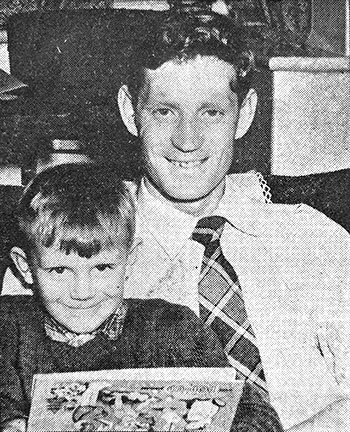
Father and son
In 1979, Les had been appointed to assist Alan Bloor, the former Stoke City player who had become Port Vale’s manager; Gordon Banks was also on the coaching staff. Gordon Lee had given the Vale board a strong endorsement of Les, describing him as one of the country’s finest coaches, in the class of Dave Sexton.
He helped to develop future England winger Mark Chamberlain in his short time in the Potteries, but having an experienced coach and former manager supporting a novice created a difficult dynamic. After a few months, Les walked away following a disagreement about team selection.
In 1984, with, in his words, "the excitement going" from living and coaching in Greece, Les returned to Britain. Although semi-retired, he accepted an approach from David Pleat to assist Luton Town by coaching the youngsters and doing some scouting. Putting down roots in Dunstable, he kept fit by becoming heavily involved with the local squash club.
Les also had two brushes with the world of showbusiness. He worked alongside the great Pelé and other stars, choreographing the football sequences in the 1981 film Escape to Victory. One of the famous sequences was the equalising overhead kick from Pelé (playing the part of Trinidadian Corporal Luis Fernandez). Les would also work with the actor playing the part of Captain Robert Hatch, an American serving with the Canadian Army and playing in goal. This was, of course, Sylvester Stallone who became a celebrity Evertonian after a visit to Goodison Park in 2007.
With his reputation in entertainment industry circles established, the former player and manager was employed in 1988 and 1989 as the technical advisor to The Manageress, a TV drama in which Cherie Lunghi played the first female manager in the macho world of English professional men’s football. One of his duties was to audition the 150 hopefuls on the pitch and see who would pass muster to appear in the series; he also choreographed the match action sequences.
Sadly, like many others, Les came to experience the debilitating impact of dementia. He was only 5’-8” but had a spring from a standing start and was good in the air. He would spend 20 minutes in training every day heading the heavy ball – so maybe that was connected to his illness in later life.
He was invited by Burnley supporter Tony Scholes to pay a final visit to Turf Moor on the final day of the 2005-06 season. In spite of his dementia, it was clear that he retained an affection for the club he spent the longest time at. Les passed away on 2 December 2007 at 81 years of age.
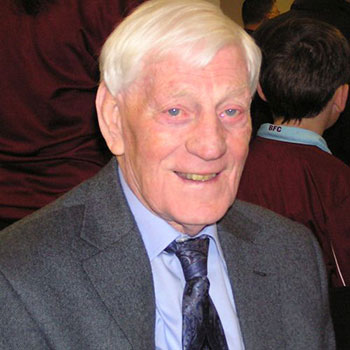
Les visiting Turf Moor in 2006 (credit Tony Scholes)
Dave Shannon, like his father, was steeped in football. As a child, he went Goodison Park and Anfield on alternate weekends. He would watch the Toffees with a neighbour and the Reds with a school PE teacher. Later, he progressed through the Sunderland youth system, having joined in 1969 and signed pro forms at 17. He was given a free transfer a week after the 1973 FA Cup Final, at which he was in Sunderland’s official party.
Signed by Stockport County, he played three first-team matches for the Hatters, scoring on his debut from the bench against Doncaster. A bomb scare at half-time had meant that the players could not return to the changing rooms, but a player needed a dressing so the physio sent Dave in to get it!
Not being retained by County, after a change in manager, Dave subsequently played as a semi-pro for Morecambe and Chorley. With encouragement from Les, he got his coaching qualifications early.
Much of his post-playing career has been focussed on Liverpool FC, where he has been involved in developing young talent at Liverpool FC. Dismissed, with several others, during the Raphael Benitez era, he has since returned to the Reds where he works on a part-time basis.
Credits/acknowledgments
My sincere thanks to Dave Shannon for sharing memories and photographs of his father.
www.uptheclarets.com (Tony Scholes article and image)
bluecorrespondent.co.uk
Various regional, national and Greek newspapers
Reader Comments (13)
Note: the following content is not moderated or vetted by the site owners at the time of submission. Comments are the responsibility of the poster. Disclaimer ()
2 Posted 29/07/2024 at 21:31:50
One of the liveliest, most vibrant cities I've ever visited. The history is everywhere and the night-life is second to none. The food is unbelievable, as good as anywhere and relatively cheap.
I went in summer so just missed the football season. Would love to see PAOK in action - the atmosphere is rabid, so I've heard?
Terrific tale btw Rob. Great stuff.
3 Posted 29/07/2024 at 22:23:27
I was in two minds whether to make a visit to the place for a City Break. Sounds an interesting place, history & good food tipped the balance.
4 Posted 29/07/2024 at 23:22:22
The Ladadika district is brilliant. The food everywhere is great. I even found 4/5 real ale bars with lots of Eastern European beers.
Aristotle, Alexander the Great, Kemal Ataturk... the streets are paved with history.
5 Posted 30/07/2024 at 00:15:27
I'm looking at Airbnbs already.
6 Posted 30/07/2024 at 12:13:34
Thanks, Rob.
7 Posted 30/07/2024 at 12:38:13
I'm surprised I don't remember his time at Everton as a coach or that he was so well respected as a coach at other teams and places like Peter@(6) remarks what great and long career he had especially as a coach — from Norris Green to spread his talent to many places in Europe and respected in most places but not Goodison Park or Bellefield!
8 Posted 30/07/2024 at 17:46:16
Liam Mogan, come again mate! Chalkidiki is near, Mount Olympus is near... A lot of good ale bars at ladadika and elsewhere, food is great as you mentioned...
Love to hear a fellow Evertonian had a good time in my city.
9 Posted 30/07/2024 at 17:55:03
I'm likely travelling late September so will look at the fixtures.
Is it easy enough to get hold of a ticket over there?
10 Posted 30/07/2024 at 18:12:33
As long we don't play against Olympiakos or Aris, you will most probably find a ticket with no big fuss. If we play against them though or against AEK or Panathinaikos and you are able to book your tickets early, you will be amazed...
Just saw the programme:
14 September against Panathinaikos...
28 September against Aris (local derby)...
11 Posted 30/07/2024 at 19:11:15
12 Posted 06/08/2024 at 09:33:22
I was working for a small market research agency in West London in the early 90s. One of the lads would occasionally arrange friendlies against other local companies. Since we only had about 10 males in the company we had to call on a few ringers. (Before anyone asks, this was well before anybody would ever suggest women were invited to play).
At that time he was living near Luton, and he was the partner of our manager for that area. To our surprise he agreed to put in a guest appearance. What he lacked in pace he more than made up for in seeing what was about to happen 10 seconds before everyone else did. His first touch and the quality of his passing stood out a mile, and he helped us to a very enjoyable 3-2 victory.
13 Posted 11/11/2025 at 21:26:56
Add Your Comments
In order to post a comment, you need to be logged in as a registered user of the site.
Or Sign up as a ToffeeWeb Member — it's free, takes just a few minutes and will allow you to post your comments on articles and Talking Points submissions across the site.
How to get rid of these ads and support TW











1 Posted 29/07/2024 at 21:01:57